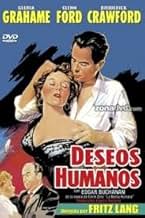AVALIAÇÃO DA IMDb
7,1/10
6,7 mil
SUA AVALIAÇÃO
De volta da Guerra da Coréia, o engenheiro e ex-militar Jeff é seduzido pela mulher de seu patrão, em uma trama que envolve um assassinato.De volta da Guerra da Coréia, o engenheiro e ex-militar Jeff é seduzido pela mulher de seu patrão, em uma trama que envolve um assassinato.De volta da Guerra da Coréia, o engenheiro e ex-militar Jeff é seduzido pela mulher de seu patrão, em uma trama que envolve um assassinato.
Benjie Bancroft
- Inquest Spectator
- (não creditado)
Paul Brinegar
- Brakeman
- (não creditado)
Minta Durfee
- Inquest Spectator
- (não creditado)
Jean Engstrom
- Mr. Owen's Secretary
- (não creditado)
Victor Hugo Greene
- Davidson
- (não creditado)
Don C. Harvey
- Yard Dispatcher
- (não creditado)
Carl Lee
- John Thurston
- (não creditado)
John Maxwell
- Chief of Police
- (não creditado)
Dorothy Phillips
- Society Matron
- (não creditado)
John Pickard
- Matt Henley
- (não creditado)
- Direção
- Roteiristas
- Elenco e equipe completos
- Produção, bilheteria e muito mais no IMDbPro
Enredo
Você sabia?
- CuriosidadesFritz Lang did not like the title and thought it redundant. "What other kind of desire is there?" is his reported comment.
- Erros de gravaçãoWhen Jeff Warren is shown operating the throttle, three quick shots show the throttle in widely different positions with the middle footage being a shot of a trainman-operated throttle. In reality, no throttle would ever be moved between positions that quickly, as it would make for a violent ride, if it did not pull the cars apart at their couplings.
- Citações
Jean: [dressing for a date] Zip me up will you, Carl?
Carl Buckley: [impatiently] You dames, you spend more time gettin' dressed...
Jean: Have to! It's much better to have good looks than brains because most of the men I know can see much better than they can think.
- ConexõesEdited into Gli ultimi giorni dell'umanità (2022)
Avaliação em destaque
It is interesting to compare Jean Renoir's La bête humaine (1938) with Human Desire as they both are based on the same novel by French literature heavyweight Emile Zola. Whereas in Renoir's movie the train and its engineer seem to be wild beasts which have to be kept under control by tight regulations, Lang's engineer is a regular guy who has returned from the Korean war and just yearns to be back on the tracks again. He clearly wants order, regularity and predictability in his life, the very things which seem to destroy the Broderick Crawford character who appears to be the real beast in Human Desire. His counterpart in the Renoir movie is an authority figure in the railroad system who more than anything else wants to keep up a front of respectability.
Gloria Grahame's character is less a femme fatale, like cocky Simone Simon in La bête humaine, than a true victim who has suffered on the hands of different men. She really looks exhausted and seems to have given up on life. In the vain hope that war experience has awakened the beast in the train engineer, she succeeds in rousing some passion in him, but it is not enough for his murdering her husband (who really is a bad character for whom it is hard to feel any pity). The final scene very much looks like her executing a carefully planned suicide-scheme which also definitely brings down her evil husband.
Both movies show that the layer of civilization is pretty thin. Lang's Human Desire distinguishes itself for being a careful probe into the social conditions of the USA in the first part of the 1950ies which is also evident in the careful set design. On several occasions the engineer talks about his war experiences which led him to have new esteem for the merits of order and civilization. It is an important item in Human Desire. Up to you to decide if this makes it a pro or an anti war movie.
Gloria Grahame's character is less a femme fatale, like cocky Simone Simon in La bête humaine, than a true victim who has suffered on the hands of different men. She really looks exhausted and seems to have given up on life. In the vain hope that war experience has awakened the beast in the train engineer, she succeeds in rousing some passion in him, but it is not enough for his murdering her husband (who really is a bad character for whom it is hard to feel any pity). The final scene very much looks like her executing a carefully planned suicide-scheme which also definitely brings down her evil husband.
Both movies show that the layer of civilization is pretty thin. Lang's Human Desire distinguishes itself for being a careful probe into the social conditions of the USA in the first part of the 1950ies which is also evident in the careful set design. On several occasions the engineer talks about his war experiences which led him to have new esteem for the merits of order and civilization. It is an important item in Human Desire. Up to you to decide if this makes it a pro or an anti war movie.
- manuel-pestalozzi
- 2 de ago. de 2007
- Link permanente
Principais escolhas
Faça login para avaliar e ver a lista de recomendações personalizadas
- How long is Human Desire?Fornecido pela Alexa
Detalhes
- Data de lançamento
- País de origem
- Idioma
- Também conhecido como
- Human Desire
- Locações de filme
- Harpers Ferry, West Virginia, EUA(shot of train crossing river outside tunnel)
- Empresa de produção
- Consulte mais créditos da empresa na IMDbPro
- Tempo de duração1 hora 31 minutos
- Cor
- Proporção
- 1.85 : 1
Contribua para esta página
Sugerir uma alteração ou adicionar conteúdo ausente

Principal brecha
By what name was Desejo Humano (1954) officially released in India in English?
Responda



































